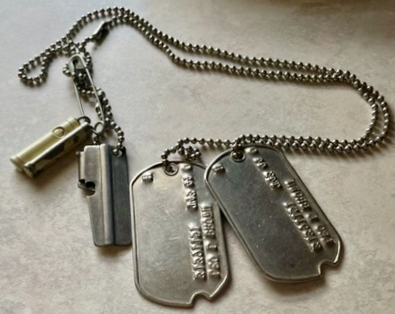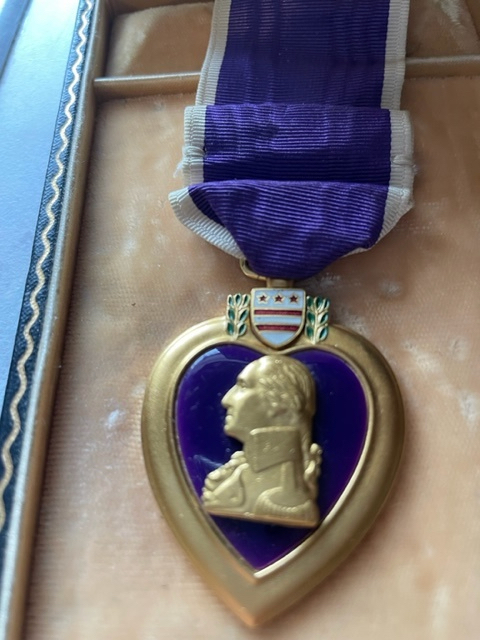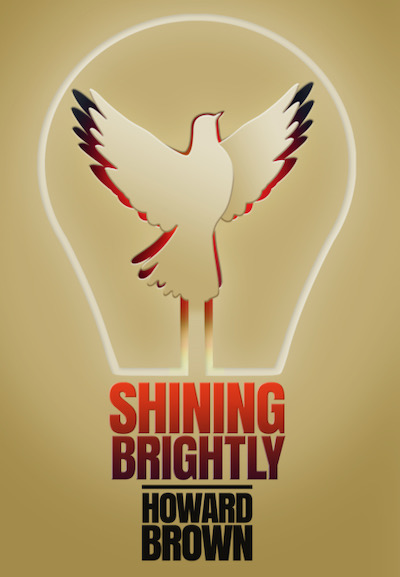
These are my grandfather Leo Brown’s “dog tags” that he wore through the U.S. campaign to liberate Italy.
Remembering the loving relationships that formed our heroes’ lives
MONDAY, MAY 29—Every year, Memorial Day is a time to remember the men and women who gave their lives in our nation’s military service. Even though my grandfather “Papa” Leo Brown survived World War II, he was severely wounded and never fully recovered from that injury. He’s gone, now, as are the majority of our World War II veterans.
Even as our families are planning spring “cook outs” or perhaps long-weekend vacations, this year, most of us will be thinking of those we have known who have served and suffered loss. Like millions of other families marking this annual milestone—our family recalls someone special: our beloved Papa Leo each year.
That’s why I’m sharing our memory of Papa Leo, taken from the pages of my memoir Shining Brightly. Since the book was published, I have heard from readers nationwide that this particular story warmed their hearts as an example of “the best of America.”
So, please, as you read this story, ponder two questions:
As we remember our heroes, do those memories fuel a vision of a terrible world full of violence and tragedy? Truly, war is hell. For some men and women, such traumatic memories continue to shape anxieties about the world.
Or, as we remember our heroes, do we focus mainly on the loving relationships that shaped those heroes’ lives? Do our Memorial Day memories lead us to greater empathy and a greater commitment to building our own healthy communities today?
Please read the following story from Chapter 2 of my memoir Shining Brightly and then decide for yourself which pathway you hope such memories will open for you today. If you like this story, please share it with friends on social media or via email.
‘A Little Slice of Eden’
The most important thing my great grandfather did before he died at a relatively young age was to move his family about an hour west of downtown Boston. He found a little slice of Eden in Worcester, where my grandfather—who I always knew as “Papa” Leo—could grow up in a remarkable neighborhood centering on Vernon Hill Park that locals called simply “the Hill” or “the Park.” It was one of those ideal American communities where Christians and Jews get along famously. That was because their ethnicity trumped their religious differences. Everyone spoke Lithuanian. By the time World War II rolled around, the local families’ patriotism and their eagerness to defeat Hitler and Mussolini trumped everything else.
How do we know this isn’t just a rosy family memory with more nostalgia than accuracy?
Because a venerable journalist stumbled across this neighborhood many years after World War II. That’s the era when Papa Leo went off to serve with the frontline American troops liberating Italy and my father Marshall was born not long after he left. The journalist was Louis Marano, the son of an immigrant family himself and a U.S. Navy veteran who earned a doctorate in anthropology and worked for decades as a reporter, based on the East Coast. Many decades after the war, Marano stumbled across stories about the vibrant Vernon Hill neighborhood. He eventually wrote a United Press International (UPI) feature story that circled the world, describing the warm relationships maintained between Park GIs serving overseas and their families back home during World War II.
The more Marano dug into the story, the more he fell in love with this blue-collar neighborhood, which he described for UPI as “conjuring up images of Norman Rockwell paintings and Frank Capra movies. During the Depression, the boys played ball in Vernon Hill Park. As teenagers and young men, they hung around Oscar Leavitt’s soda fountain and flirted with the nursing students who flocked there on their breaks from nearby St. Vincent’s Hospital.”
What’s remarkable about that soda fountain is that Papa Leo and other Jewish guys hung out there along with the Catholics and Protestants in the neighborhood. Before World War II, Papa Leo married my Nana Rose, so we assume he didn’t continue to flirt with the girls at the soda fountain after that. But Papa Leo was a true extrovert who was part of that crowd. He also was one of the guys from the Park who Marano described for UPI as maintaining a kind of hyper-local news service—direct from the front lines back to the old neighborhood. There were more than two dozen regular Park correspondents, servicemen scattered all around the world during World War II. In their letters home, they had to avoid military censors that prevented them for sharing any sensitive news about their units—but they could send home heartfelt best wishes and little anecdotes that would amuse and inspire the folks back home.
The hub of this impromptu news operation was the soda fountain where families would drop off the guys’ military addresses. The men in service would send handwritten letters to the soda fountain for a little newspaper called The Vernon Hill Spiel, the German-Yiddish term for “a talk.” The editor, Don Gribbons, was a volunteer firefighter and worked at a real local newspaper. Like a Frank Capra movie, everyone pitched in for a few years! Don would type up stencils for the Spiel at the firehouse, then carry them to his local newspaper offices and run them off on a borrowed mimeograph machine. Then, some copies were left at the soda fountain for families of the servicemen; some were mailed around the world. Soon, every two weeks, Don and his friends were sending out 850 copies.
What filled all those pages of Gribbons’ hand-crafted, indie newspaper? His stories came from nearly 1,500 letters that were mailed to him by local guys from wherever they were serving on the planet.
Papa Leo was a regular correspondent to his buddies back home. To this day, we cherish his handwritten V-Mail letters to the Spiel. “It feels swell to read about the old gang from the Park,” he began one letter from the front lines in Italy. All he managed to get past the censors about his location was this: “I’m here somewhere in Italy and the scenery here is very beautiful, but I would rather be back in the Park any day. My wife tells me that you have put up a beautiful plaque with all the names inscribed at the Park. I sure am proud to know mine is on it and hope that real soon I get to see it myself.”
Only many years after the war did my family learn the details of that brutal campaign to recapture Italy all the way from Sicily northward through the boot across one horrendous German line after another. More than 300,000 Americans were wounded and more than 60,000 died in bloody, entrenched battles for places like Anzio, Moro River and Monte Cassino.
Papa Leo was one of the casualties, wounded in his leg. Somehow, he even managed to turn that story into ray of sunshine.
As he described it for the Spiel, he lay there bleeding with a makeshift bandage, hoping that an ambulance would take him to a field hospital. As one came rumbling along, he was stunned to discover a buddy from the old neighborhood driving toward him. In his Spiel story, he wrote, “I met none other than Sgt. Tanona driving the ambulance that I rode in! He almost jumped out of his uniform when I told him I was from Vernon Hill. Had a nice chat as I rode to the hospital, talking about all the boys from the Park.”
The wound was serious enough to require hospitalization, but it wasn’t dire enough to send him home. The Army needed every soldier the doctors could patch up sufficiently to keep doing something for the war effort. Papa Leo couldn’t march anymore but he soon was driving trucks—a profession he continued when he eventually got home.
I was always wide-eyed when he told his war stories. Always on the move, he wound up in Milan and witnessed the crowd stringing up the battered corpses of Benito Mussolini and his mistress. What a horrific scene! During the war, he was not able to get that story past the U.S. Army censors to the Spiel. But, around that time, he was able to report a much sunnier story about meeting yet another hometown resident near the battlefield. This time, the story concerned a woman named Shirley Albert, who was part of “a USO stage show that’s over here touring the foxholes. It sure felt good to talk to someone from Worcester—and a gal at that!”
When the war in Europe finally was over, he reported for the Spiel about all the guys who went from “living in foxholes to moving into hotels” as they waited for available transports back home. Many feared they would be shipped to the Pacific, where war was still raging, he reported. In his final columns for the Spiel, his fondest wishes remained for the health and safety of “the boys from the hill.” Real relationships.
And, when the gregarious Papa Leo did get a transport home from Europe, his wounded leg still had not regained its full agility. It never would, but he kept moving anyway and because of his experience driving in Italy he found a job as a truck driver.
He lived long enough to see me win my own war with stage IV cancer. I will never forget the day he came to the hospital where I received the treatment that eventually knocked out that first cancer. Papa Leo and Nana Rose had come to visit me that day—but he also began walking along my entire hallway in the hospital shaking the hand of every nurse and doctor in sight, thanking them sincerely for saving his grandson.
His compassionate eye was always on the other men and women in the community around him.
What mattered?
Papa Leo knew: caring relationships.
.
.
.
.
 Care to learn more?
Care to learn more?
This is a perfect moment to become one of Howard’s growing global community of friends by ordering your copy of his book.
Here are other articles we have published, exploring the launch of this book:
Take a look at the book’s Foreword: ‘Shining Brightly’ Foreword by Dr. Robert J. Wicks: ‘Learn anew about the American Dream’
And especially read this story: Two-time cancer survivor Howard Brown writes ‘Shining Brightly’ to encourage others to stay healthy
Free Resource Guides
Download (and free-to-share) resource guides for discussing Shining Brightly:
- First is What are the ‘Keys to Resiliency when Confronting Cancer?’ Howard is freely sharing resources from the Discussion Guide for his new book—a page that lists 18 keys to resiliency that have proven valuable in his life and in the lives of people he has mentored through cancer.
- Second is Why should we become mentors?
- And finally Interfaith Bridge Building: Why do this work?
.
.
.



Tell Us What You Think